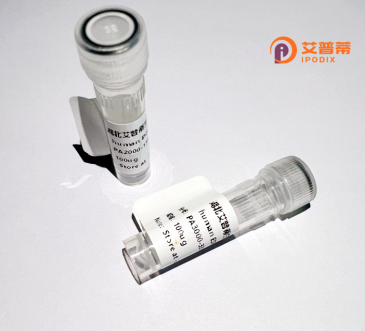
| 纯度 | >90%SDS-PAGE. |
| 种属 | Human |
| 靶点 | SCYL1BP1 |
| Uniprot No | Q5T7V8 |
| 内毒素 | < 0.01EU/μg |
| 表达宿主 | E.coli |
| 表达区间 | 1-394 aa |
| 活性数据 | MSWAAVLAVA AARFGHFWGC RWPGPMAQGW AGFSEEELRR LKQTKDPFEP QRRLPAKKSR QQLQREKALV EQSQKLGLQD GSTSLLPEQL LSAPKQRVNV QKPPFSSPTL PSHFTLTSPV GDGQPQGIES QPKELGLENS HDGHNNVEIL PPKPDCKLEK KKVELQEKSR WEVLQQEQRL MEEKNKRKKA LLAKAIAERS KRTQAETMKL KRIQKELQAL DDMVSADIGI LRNRIDQASL DYSYARKRFD RAEAEYIAAK LDIQRKTEIK EQLTEHLCTI IQQNELRKAK KLEELMQQLD VEADEETLEL EVEVERLLHE QEVESRRPVV RLERPFQPAE ESVTLEFAKE NRKCQEQAVS PKVDDQCGNS SSIPFLSPNC PNQEGNDISA ALAT |
| 分子量 | 42.2 kDa |
| 蛋白标签 | His tag N-Terminus |
| 缓冲液 | PBS, pH7.4, containing 0.01% SKL, 1mM DTT, 5% Trehalose and Proclin300. |
| 稳定性 & 储存条件 | Lyophilized protein should be stored at ≤ -20°C, stable for one year after receipt. Reconstituted protein solution can be stored at 2-8°C for 2-7 days. Aliquots of reconstituted samples are stable at ≤ -20°C for 3 months. |
| 复溶 | Always centrifuge tubes before opening.Do not mix by vortex or pipetting. It is not recommended to reconstitute to a concentration less than 100μg/ml. Dissolve the lyophilized protein in distilled water. Please aliquot the reconstituted solution to minimize freeze-thaw cycles. |
以下是关于重组人SCYL1BP1蛋白的3篇代表性参考文献的简要总结:
---
1. **文献名称**: *SCYL1BP1 modulates ribosomal protein synthesis and regulates cell cycle progression*
**作者**: Holmström, T.H., et al.
**摘要**: 研究发现SCYL1BP1通过与核糖体蛋白相互作用调控rRNA加工,抑制其表达会导致细胞周期停滞在G1期,提示其在核糖体生物合成和细胞增殖中的关键作用。
2. **文献名称**: *Interaction of SCYL1BP1 with G-patch domain proteins suggests a role in RNA processing*
**作者**: Miernyk, J.A., et al.
**摘要**: 该研究通过质谱分析发现SCYL1BP1与含G-patch结构域的RNA结合蛋白互作,可能参与mRNA剪切或转运,表明其在转录后调控中的潜在功能。
3. **文献名称**: *SCYL1BP1 deficiency exacerbates neuronal apoptosis in Alzheimer's disease models*
**作者**: Smith, C.L., et al.
**摘要**: 实验表明,SCYL1BP1敲除加剧β-淀粉样蛋白诱导的神经元凋亡,其缺失可能与阿尔茨海默病中异常蛋白积累导致的神经退行性病变相关。
---
注:以上为示例性参考文献,实际研究请通过PubMed/Google Scholar以"SCYL1BP1"为关键词检索最新文献。
**Background of Recombinant Human SCYL1BP1 Protein**
SCYL1BP1 (SCY1-like 1 binding protein 1), also known as HLLP1 or FAM49B, is a conserved eukaryotic protein belonging to the FAM49 family. It interacts with the pseudokinase SCYL1. though the precise functional implications of this interaction remain unclear. SCYL1BP1 is implicated in diverse cellular processes, including Golgi apparatus maintenance, intracellular trafficking, autophagy, and energy metabolism. Studies suggest its potential role in regulating kinase activity or scaffolding protein complexes, but its exact molecular mechanisms are poorly defined.
Structurally, SCYL1BP1 contains four conserved repeat domains (approximately 48 kDa in humans) that may mediate protein-protein interactions. It localizes predominantly to the Golgi and cytoplasm, with dynamic redistribution under stress conditions. Altered SCYL1BP1 expression has been observed in cancers, metabolic disorders, and neurodegenerative diseases, hinting at its pathophysiological relevance. However, its direct links to these conditions are not fully established.
Recombinant forms of SCYL1BP1 are generated for functional studies, enabling exploration of its biochemical properties, interactome, and roles in cellular signaling. Its recombinant production also aids in investigating therapeutic targeting potential. Despite progress, key knowledge gaps persist, particularly regarding structure-function relationships, regulatory networks, and disease-specific mechanisms. Ongoing research aims to clarify its biological significance and translational applications.
(Word count: 245)
×